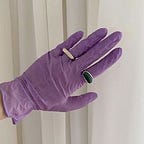Is contemporary shopping in Nigeria a scam, or just different?
I still don’t know how I feel about shopping in Nigeria. It’s such a weird and hectic trip searching for decent items at an approachable price point, only to be met with items made with questionable intention. It’s like with every purchase you discover something about the sellers and learn more about your shopping habits.
Many months ago, a friend was talking about buying a dress from one contemporary brand in Nigeria. I’m used to these conversations, like friends telling me they want to buy things off the internet — thanks, Instagram. I know what shopping gives me: joy. But why didn’t that dress do the same?
One of the greatest things about Pinterest, at least to me, is that it has actually given me a wide view of clothing and accessories so it’s easier for me to spot an inspiration or an imitation when I see one. Sometimes, when I’m tapping through new collections, I see things I’ve most certainly seen before…somewhere — thanks, Pinterest.
That’s why the dress didn’t give me joy. I had seen it, or something like it before. And more importantly, for less.
In like manner, when Tacha announced the launch of her clothing line NLNT, parts of the internet went up in flames talking about how the fitness collection was amazing. Yeah, well, Nigerian influencer, Onyiibekeh wore a look from the collection in Mayorkun’s Betty Butter video — it was not NLNT.
My question is: How do we ‘buy Nigerian’ when we’re constantly left to feel like we’re being played big time?
Fast fashion in contemporary clothing
I don’t know what’s more annoying. The quality of the items, the price points or their use of English mixed with bragging rights (or white lies) talking about “illustrating from scratch” or “original” ideas as part of a vision they held since they were children. Or could it be the excuse that 3–20 percent of copying is as good as new in the eyes of the *American* law?
On each fashion round I go on, I see close to 65% of “original” items retailed exclusively by more than at least three brands. And this no doubt makes shopping from premium/contemporary Nigerian brands (I’ll spare the designer brands for now) feel all the more disappointing.
When a brand like Rendoll forces you to spend close to N40,000 on an item — that you’ve seen somewhere else — minus shipping, you’re more likely to think why? What merits that pricing? It’s so complicated thinking about it and really messed up finding out you could have got it else where...for less.
If these brands positioned themselves in the market as fast fashion brands, their imitations could be ‘understandable’ in the sense that replicas and imitations are fast fashion’s MO.
Fast fashion brands routinely rip-off the work of independent or small brands who commonly know little about international copyright laws, can’t afford lawyers, and sometimes don’t even realize. Asides the percent rule, they believe that if you can’t afford to buy the designer label, they will offer it to you for less.
When “premium” Nigerian brands rip off independent, small or even fast fashion brands (who are already ripping off other brands) you’re left to wonder what sort of bonkers that is.
The Concept of Generic
Think of it as drafting in tailoring. Something of a template design for many items e.g. a t-shirt. This template is often referred to as generic or unbranded. Generic is good. In fact, when it comes to mass gift packaging, it’s perfect. When an item is unbranded, anyone can use it. It’s open to the public and does not legally belong to a particular company.
For me, I can say I understand if unbranded was packaged as a souvenir. But to be packaged for resale as part of a collection illustrated from scratch? Not on my Naira and Kobo.
When NLNT dropped it’s first collection, it retailed at $56 (N26,000) something generic that was gotten for as low as $9 (N4,150) — on retail. It’s simple, the pricing was inflated (let’s hold off on customs).
Here’s what I’m saying: You might run away from shopping destinations like AliExpress to avoid purchasing fakes. Unfortunately, every race might lead you to shopping Nigerian brands which sell “unbranded” products…off the same AliExpress. For instance, the fitness clothing from NLNT and co as listed on AliExpress has an RRP of $20 as opposed to $50-$70 the aforementioned brand gives after they’ve plaster their name on it.
Cheap, unbranded apparel passed off as a brand’s collection makes true fashionistas or any other shopper struggle to see the brand as a fashion destination.
I bring this up mostly because I’m truly a consumer of fashion. Not only the clothes but how they came to be and the price they’re offered to me at. I’m passionate about transparent and responsible retailers. The activities of fashion producers in this country feel like someone took a bat and hit me with it. And as far as sustainability goes, we’d have to revisit that topic some other time.
For what it’s worth, I’ll always tell you to buy Nigerian — you better — but hey, while you do, be a knowledgeable skeptic and check AliExpress or at least, start there 😘
If you need more convincing, try Google lensing an image.
